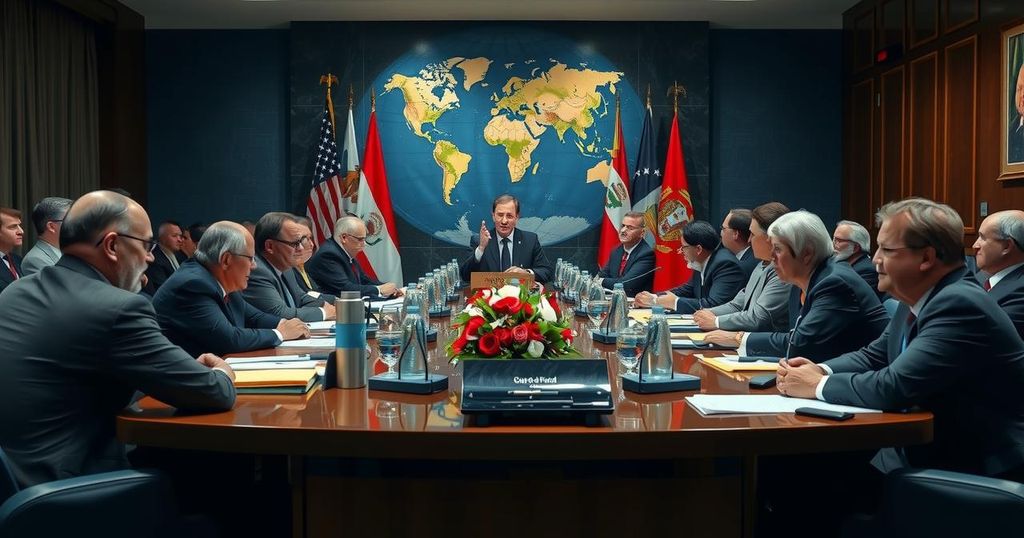G20 Summit in Brazil: Climate Action and Geopolitical Challenges on the Agenda

The G20 summit in Brazil features discussions on climate change, the Ukraine conflict, and global poverty, with leaders like Biden and Lula aiming to reach consensus. Amidst heightened security and tensions, the summit serves as a key forum to address these urgent issues while Trump’s potential return to power looms.
Leaders of the G20 convened in Brazil on Monday to reenergize stalled climate discussions and address divisions over ongoing conflicts in the Middle East and Ukraine, particularly in light of former President Donald Trump’s potential return to power. “Brazilian President Luiz Inacio Lula da Silva is prioritizing themes such as combating hunger and climate change, alongside imposing higher taxes on billionaires. However, the wars that have polarized G20 nations will be a major point of contention.” US President Joe Biden, attending what will be his final summit as he nears the end of his term, is perceived by some as a lame-duck leader, overshadowed by Chinese President Xi Jinping, who remains the most prominent figure in this year’s discussions. A Brazilian source indicated that specific nations are advocating for revisions to the summit’s draft communique, which has already been finalized by Brazil and some allied countries. Intriguingly, Biden’s recent decision to permit the use of long-range US missiles by Ukraine represents a significant policy shift that may compel European allies to reconsider their own positions regarding the conflict. Furthermore, G20 leaders face the urgent task of revitalizing UN climate talks currently stalled in Azerbaijan, primarily concerning climate financing for developing nations. UN Secretary-General Antonio Guterres has called upon G20 members, responsible for 80% of global emissions, to demonstrate leadership to mediate an agreement. Tightened security measures for the summit come in the wake of a recent failed bombing attempt on Brazil’s Supreme Court, executed by a suspected far-right extremist. This summit forms part of President Biden’s diplomatic tour, concluding in an Amazon visit aimed at uplifting his environmental legacy. With heightened scrutiny on climate issues, everyone awaits significant advancements from the concurrent COP29 climate conference in Azerbaijan, which has seen an urgent call to generate $1 trillion annually for developing nations to tackle climate change. Despite challenges, including Brazil’s extreme weather marked by its worst wildfire season in over a decade, there was a previous call at the last G20 in India to triple renewable energy by 2030, although no explicit move was made to restrict fossil fuel usage. Notably absent from the summit is Russian President Vladimir Putin, facing an arrest warrant from the International Criminal Court regarding Ukraine. In context, Lula emphasized the need to prioritize dialogues on global poverty, stating, “I did not want the wars in Ukraine and the Middle East to take the focus off global poverty.” Lula aims to shift the narrative toward a Global Alliance against Hunger and Poverty, advocating for increased taxes on wealthy individuals. However, some resistance exists, particularly from Argentinian President Javier Milei, who met with Trump recently and expressed differing views on the summit’s goals. Regardless, a Brazilian foreign ministry representative expressed optimism about achieving a consensus, deeming it unlikely for Argentina to obstruct proceedings.
The G20, comprising the world’s largest economies, meets annually to discuss global economic and development issues. This year’s summit is particularly significant due to the presence of major geopolitical tensions such as the Ukraine conflict and ongoing climate concerns exacerbated by environmental disasters worldwide. As wealth inequality and climate change become ever more pressing global issues, discussions on combatting poverty and enhancing climate financing for developing nations are increasingly relevant. With Biden’s presidency nearing its end and Trump’s potential comeback, the dynamics of leadership and policy direction are also in play, impacting both domestic and international agendas.
The G20 summit in Brazil serves as a crucial platform for addressing pressing global issues, including climate change and geopolitical conflicts. With Biden attending in a diminished capacity as he approaches the conclusion of his presidency, leaders must navigate significant divergences in policy while striving for resolutions that balance economic growth with urgent environmental responsibilities. Lula’s focus on hunger and wealth inequality underscores the importance of inclusive dialogue amidst this complex global backdrop. Overall, the success of this summit could pave the way for more effective international cooperation in tackling shared challenges.
Original Source: www.fox28spokane.com







